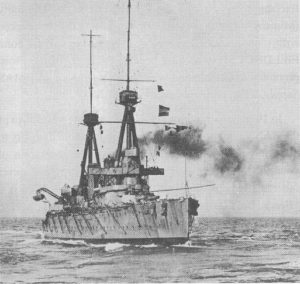- Author
- A.N. Other and NHSA Webmaster
- Subjects
- WWI operations
- Tags
-
- RAN Ships
- None noted.
- Publication
- June 2002 edition of the Naval Historical Review (all rights reserved)
[Ed: This is an extract from an unknown Australian newspaper of the time.]
Every now and then there return to Australia men who have served their King and Country on deep water. They are not received by Red Cross ladies nor are they acclaimed by the public, or given receptions. The motto of the Navy is: “We do our duty!” And, therefore, these heroes of the Seven Seas come home to Australia unheralded, practically unhonoured, most certainly unsung.
One such recently came back to his native land and had a thrilling story to tell – the first-hand story of how Admiral Sturdee’s fleet out-manoeuvred and sank Admiral Von Spee’s fleet off the Falkland Islands on December 8, 1914. Like all the rest of these boys in the navy, he will not allow his name to appear. Officers and men of the A.I.F. can do this with impunity, but the man who serves in the senior arm of the service is, like the late Lord Roberts, a “man who does not advertise.”
Anyhow, this warrant officer had a good story to impart. He stated that Admiral Sturdee’s fleet got news at home that it was to be ordered out for certain, but unspecified, work, and off it went.
“When we left the home shores,” said this officer, “our orders were secret, and all wireless messages, incoming or out, were jammed. The Admiral knew his orders, and beyond these he was not going to bother about anything. We were put through the severest training conditions from the start, and they were only slightly relaxed when we “crossed the line,” going south, and the time-honoured observances were permitted for one day. In fact, it was almost arranged that the Admiral himself should be dealt with faithfully by Father Neptune, but he was not. On September 7 at 6 pm, we raised Port Stanley and prepared for coaling, not having the faintest idea that the Germans were anywhere in the vicinity. There was a big British fleet in this part, and at 5.30 the next morning we started coaling ship, and then went to breakfast. We had no sooner finished than the shore station reported enemy cruisers in sight. We stopped coaling, sluiced down the ships, and stood out to meet the enemy, full steam having been raised in the meantime, though we had nothing like taken on our full lot of coal.

“Once outside the harbour we could see the enemy ships and a great cloud of smoke. The moment the enemy spotted us coming their way they bolted. Every ounce of steam was demanded by the Admiral and we surged forward – the leading ship of the line-at 27 to 28 knots. On the stroke of 11 o’clock we passed the Nurnberg and Leipzig at this pace, leaving them standing. They were not worth our fire, being only light cruisers and quite easily dealt with by our ships following. We were after bigger game. My position was in the forward turret, and I fired the first shot of the action at 20,500 yards. It went over the enemy. I could only see the hull of the vessel, and fired according to the range given. At this shot the Germans swung off again and showed flight. We closed up with our superior speed, and opened again at 18,000 yards. The Germans swung around again, but we had got their range and lobbed shell after shell on them. We picked out the Scharnhorst, their flagship, and dealt with her while our smoke screened our following ships. The Germans, however, were very clever in their manoeuvring, and when we corrected sight they would dash in and our shells as a consequence would go over them. Their guns, too, being hand-loaded, could fire more quickly than ours, and their broadsides won’t blind our `spotters’ as far as our hits and their ships were concerned.
“The enemy found us in their third salvo of eight guns, and the shells struck the turret I was in. Seven of the men and the officer were knocked insensible owing to the concussion and I, with a few men, was left to carry on. Luckily the fire of their guns saved us the need of a fire-party, as their shells subsequently, all falling short, drenched us and the ship with spray, which sometimes rose masthead-high, and, falling on our decks, put out all fires. The spray from these shells blurred our telescope sights in the turret, and a ship’s boy, 16½ years of age, was sent out on to the outside of the turret to keep the glasses clean. He went out like a shot, and in the heat of the engagement we forgot all about him. He stayed out there for over four hours, and when the German fleet was a thing of the past he dropped down into the turret, as black as the ace of spades, from the smoke of our guns and simply asked, “Did I keep the glasses clean, sir?” He was recommended for, and has since received, the D.C.M. He ought to have had the V.C. It’s the coolest action ever read or heard of in the whole story of the British navy. Just fancy the little kid straddled over our telescope on the outside of a turret in action, with shells bursting all round him, calmly keeping our sights clean so that we could ‘plug’ the enemy. No words can express adequately such heroism, and that of only a lad of tender years.




